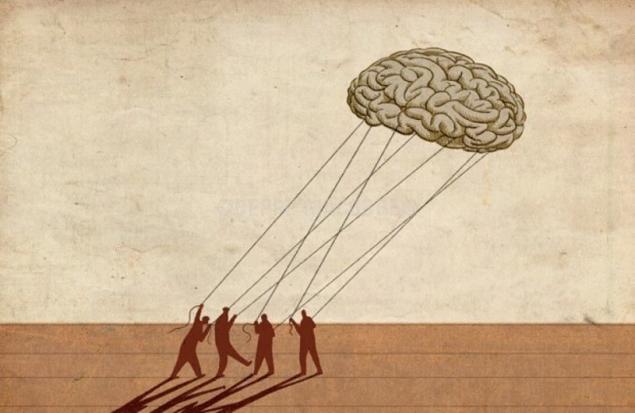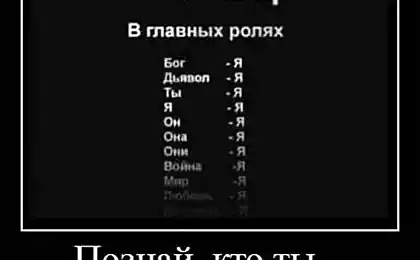198
The illusion of self-understanding

There is one very persistent illusion that many, many people have: the illusion of self-understanding and self-awareness. It is the idea that you understand everything about yourself, control your thoughts, feelings and actions, and can explain why you do it. Nineteenth-century Europeans for the most part did not think that something in their behavior could not be controlled. As the psychologist-researcher D. Barg writes, “We all care very much about the idea that we are the masters of our own souls, that we are at the helm, and the opposite is very scary.” In fact, this is psychosis – a sense of detachment from reality, loss of control, and this will scare anyone.”
The frightening discovery of the twentieth century is that we are really not at the helm.
To be more precise, we can control our own path, but we need to wake up, get behind the wheel and have an idea of where to go. And to wake up is greatly hindered by the belief that we are already awake and in charge of everything. This belief is so strong that people do not notice the obvious absurdity and contradictions in their own behavior.
So, extremely aggressive people can seriously believe that they are actually kind and sweet. But this man is a little tense... And this one. And if you kill a couple hundred thousand people, then peace will not leave their souls.
Those who wish to do good do not see that they are doing evil. Those living in the most difficult psychological conditions have become so good at deceiving themselves that they are now diligently convincing others that they are well, but others are living incorrectly. I have met people who have become fascinated with Buddhism and have convinced themselves that they are free from all passions and attachments. But they defended their convictions with such fury, and spoke with such passion in their voices of their impartiality that they hardly believed. I didn't believe it at all. As the old joke goes, “I flew five thousand miles to tell you in your face how indifferent I am.” I noticed a tendency: the more “enlightened” a person is, the worse he notices his own shadow sides, which are very strongly noticed from the outside. The famous Dunning-Kruger effect: “The less competent a person is, the more he overestimates himself and his competence.” As Russell said, “Only fools and fanatics are confident, intelligent people are always tormented by doubts.” The less competent people are in themselves, the more categorically they say, I never envy. You should always do that. I love everyone (or should love everyone).
The following words were spoken by one man to his girlfriend:
I understood everything, I realized that I constantly put pressure on people around me, and they feel bad about it, yes. Okay, I'm ready to change. Lena, now it's your turn! Admit that you were wrong, admit that you were unworthy. If you don’t realize it, I just don’t know what I’m going to do.
He doesn’t really see the paradox in what he says.
People are constantly deceiving themselves, big and small. Psychologist Tom Wilson once asked two groups of students to choose from a large number of paintings and posters, and take home. Only the students in the second group had to explain in writing why they liked the paintings. Six months later, Wilson asked the participants if they liked the paintings. Those who came and went without much thought were quite satisfied. Those who gave explanations quietly hated their posters and paintings.
Psychology knocked out from under our feet the confidence that we remember. Studies have shown that we do not remember reality. We remember a picture consisting of elements of reality connected by fantasy and fiction. Let me give you a wonderful experiment by W. Naisser. He asked a group of students to tell them what they had heard about the Challenger space shuttle explosion on the news. All the students wrote more or less realistic reports. Three years later, Naisser asked the remaining 44 students to recall the event. There were no accurate reports, and a quarter of them were completely different from the old ones. So, one subject in the old report reported that he learned about what happened in the dining room, and in the new – that “some girl ran into the hall and shouted that the shuttle exploded.” Another student found out about the explosion in religious studies, but a new report revealed that she was watching TV with friends, and there in the emergency news reported a shocking disaster. When the students were shown their old reports, many insisted that the later memories were more accurate. They were very reluctant to agree with early reports. “Yes, this is my handwriting, but I still remember it differently!” Unconscious. pp. 112-113.
“But I still remember differently!” – because it’s scary to imagine that most of what you remember is fantasy. That fiction and reality are intertwined so closely that it is no longer clear what, where and how it was in the past. And that you don't control memory. No way.
Even knowing about some of your own peculiarities, understanding your own absurdity, often does not help.
I kept telling myself that I would no longer deal with alcoholics. All! And so I go, I see a handsome man, we like each other, passion flares up. And at some point I'll find out he likes to drink. Very much. I am desperate, I try all the time to break out of this vicious circle, but again and again I find that the normal ones are not interesting, boring, and I instantly and completely unconsciously calculate alcoholics from the crowd as “interesting men.” Some demon has invaded me and I can't do anything about it.
The girl seems to understand, but there is no control over what is happening. This creates despair, the feeling that a person does not have power over himself. "Fate," "karma."
The main consequence of the illusion of self-understanding is such a powerful defensive reaction as “this cannot happen to me!”
I will never fall into any sect, it is impossible for me to “brainwash” (this is what quite intelligent people thought, however, with the illusion that they understand themselves).
I know how to really, because I can be objective! (so say people who have spent a lot of effort to ignore everything that does not fit into the “how to really”)
My opinion is based on life experience and facts, and opponents succumbed to propaganda and lies! (so often think those who reproduce the most used clichés).
If you suddenly realize that you do not understand yourself well, it may not be so terrible. Perhaps it is at this point that the illusion of self-understanding begins to be overcome. Someone does not need it, because, after all, a better understanding of their motives and goals does not always lead to happiness, in much wisdom – many sorrows.
In general, don't be deceived. published
Author: Ilya Latypov
P.S. And remember, just by changing your consciousness – together we change the world!
Source: ilyalatypov.ru/o-psyhoterapii/illyuziya-samoponimaniya
Tesla will show "budget" electric car Model 3 in 2016
Biggest mistake of parents is to give children what they themselves lacked in childhood























